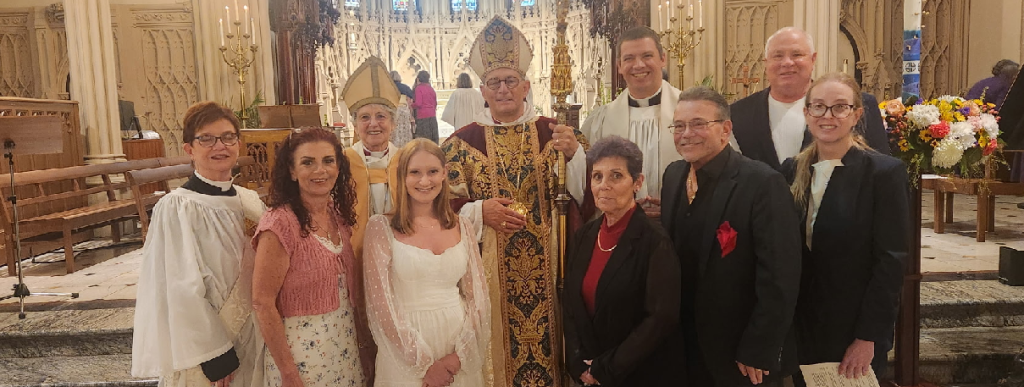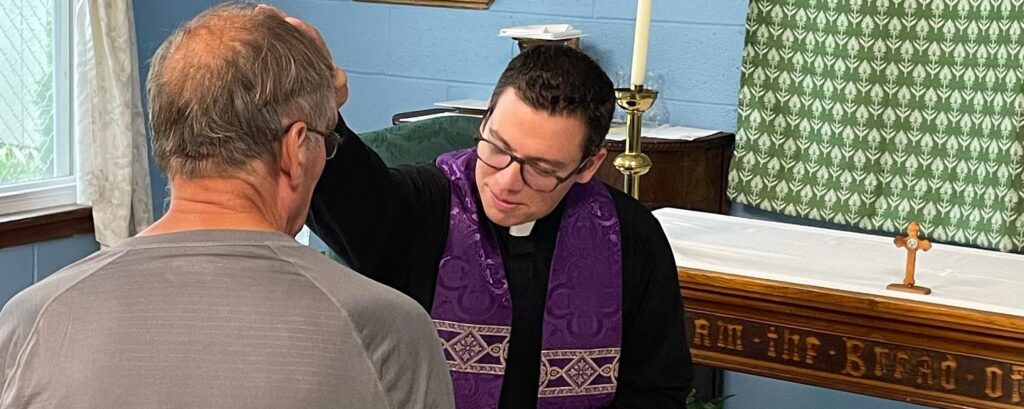According to our Book of Common Prayer (the prayer book that unites Episcopalians from all forms of life), the sacraments are “outward and visible signs of inward and spiritual grace, given by Christ” (BCP 860). We celebrate the two sacraments given by Jesus to his disciples: Baptism and Communion. We also have five other sacramental rites: confirmation, ordination, holy matrimony (marriage), reconciliation of a penitent (confession), and unction (anointing of the sick).
Baptism, according to our catechism, is the sacrament “by which God adopts us as His children and makes us members of Christ’s Body, the Church, and inheritors of the kingdom of God.” The bishop, priest, or deacon who baptizes the child or adult uses the outward and visible sign of water, blessed by the clergy, and washed over the intended’s forehead. This is for the inward and spiritual grace of union with Chris in His death and resurrection, birth into God’s family (the Church), and new life in the Holy Spirit. Baptism is the traditional initiation rite for infants into the church, but one can be baptized at any age in the formula of the Father, the Son, and the Holy Spirit (BCP 860). If you would like your child to be baptized or you yourself would like to be baptized, please reach out to the parish priest through the office or via email.
Communion, also known as The Lord’s Supper, the Divine Liturgy, Holy Eucharist, the Mass, the Great Offering is the corporate worship of the church: when two or three gather together in God’s name, hear holy scripture, pray for their loved ones and their community, break bread together, and praise God (BCP 860). The bread, broken and distributed is Holy Communion. It is our primary act of worship on Sunday Mornings. As Episcopalians, we believe that God is fully present with the bread and wine that is consecrated; a theology of consubstantiation (meaning: with the substance). We believe that the bread and wine, once prayed over, are sacred; God is with the bread and wine. Although their physical properties may not transform, we believe that the gifts of God, blessed by the priest and through the Holy Spirit, becomes the Body of Christ, the Bread from Heaven, and the Blood of Christ, which is the cup of salvation. There is no official timeline when someone needs to receive communion by a certain date (example: third graders are not late if they have not received communion). The conversation between the the parish priest and the intended recipient (if the recipient is a minor, then with the minor’s parent(s) and/or guardian(s).
The other sacramental rites which evolved in the church (as previously mentioned) confirmation, ordination, holy matrimony (marriage), reconciliation of a penitent (confession), and unction (anointing of the sick).

Confirmation is when a young adult makes a mature commitment to Christ, reaffirming the promises made on their behalf as an infant, by their godparents (BCP 860). Usually, this commitment is made to the diocesan bishop on a visitation to the parish or on special occasions by the parish priest (like Easter or Pentecost). Any interested parties should speak to the parish priest. If you have not received confirmation in the Episcopal Church, but have in another denomination, the Episcopal Church acknowledges your confirmation in all branches of the Jesus movement! We have a Rite of Reception, where one can acknowledge their commitment to Christ in the Episcopal Church. See in the picture above when we received several new members into our congregation from other denominations. Again, speak to the parish priest if this applies to you.

Ordination is the rite in which God gives authority and grace of the Holy Spirit to those being made bishops, priests, and deacons through prayer and the laying on of hands (BCP 860). This involves acquiring a Master’s Degree in Divinity from a seminary, and discernment with your parish community and priest. If you are feeling a call to discern serving the Episcopal Church as an ordained minister (a deacon or a priest), please speak to your parish priest after church on Sunday.
Holy Matrimony (Marriage) is the rite where two human beings chose to enter into a life-long union, make their vows before God and the Church, and receive the grace and blessing of God to help them fulfill their vows (BCP 861). In the Episcopal Church, we are affirming allies and members of the LGBTQIA+ community. God is love and marriage is blessed (same-sex or between man and woman). Weddings can happen within the church building or at a venue. Couples interested in getting married should call the church or email the office to set up a meeting with the parish priest.

Reconciliation of a Penitent (Confession) is the sacramental rite where those who which to unburden themselves by confessing to a priest may confess to God in the presence of their priest, and receive assurance of pardon and the grace of absolution (BCP 861). This sacramental rite may be done at any time with the parish priest or another local priest. If interested in receiving the Rite of Reconciliation, please speak to the parish priest.

Unction of the Sick (Anointing of the Sick) is when the priest or deacon comes to visit someone who is sick or one who is about to have a medical procedure, with holy oil that has been blessed by the bishop, with anointing the recipient’s head and hands with oil, the laying on of hands, by which God’s grace is given for the healing of spirit, mind, and body (BCP 861). If a parishioner is bedridden at home, in the hospital, a physical rehabilitation center, or about to go for surgery, the priest or deacon can anoint the intended at Sunday mass, or wherever the bedridden is residing. Persons in need should call the parish office or speak to the parish priest after Sunday mass.